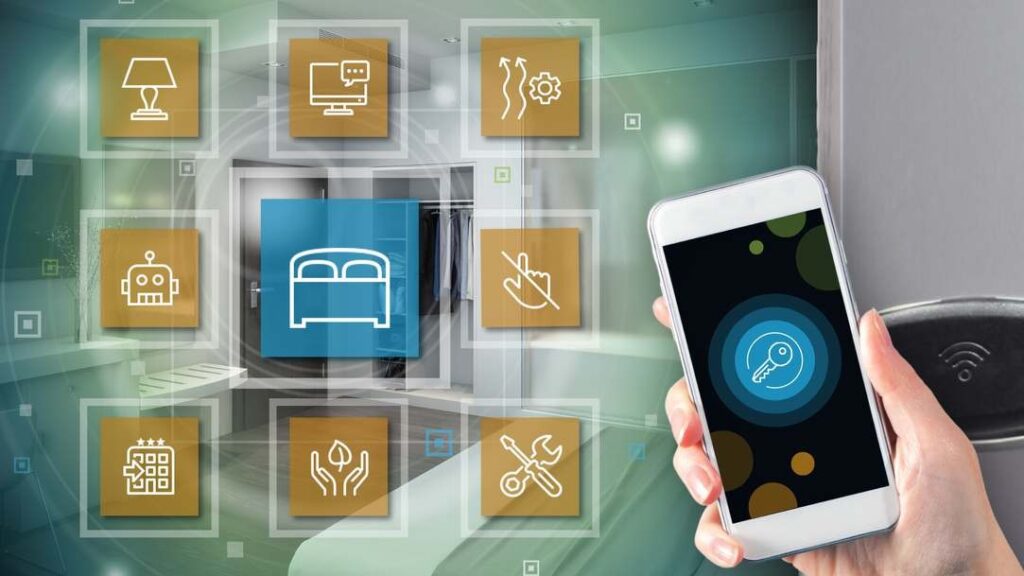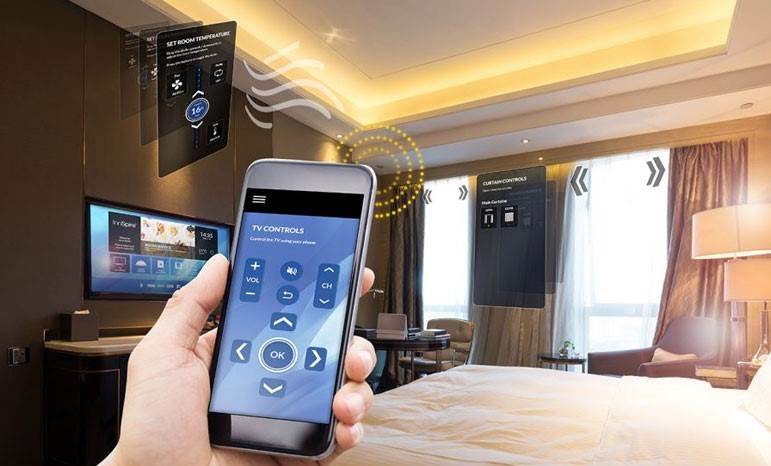Table of Contents
Introduction
Technology in Hospitality has undergone a massive transformation due to the integration of digital innovations. With the emergence of cutting-edge technologies, the sector is rapidly evolving, creating more efficient operations, offering personalized guest experiences, and boosting profitability. In this blog, we will explore how technology is reshaping the hospitality industry and the extensive benefits it offers. From customer service automation to data-driven decision-making, the industry is experiencing a digital revolution like never before.

What are the Benefits of Digital Transformation in the Hospitality Industry?
1. Enhanced Guest Experience
One of the most significant advantages of digital transformation in the hospitality industry is the improvement in guest experience. With the help of technology, hotels, and resorts can offer personalized services such as customized room settings, smart room controls, and virtual concierges. For example, mobile check-in and check-out processes have streamlined the guest journey, reducing wait times and offering convenience.
Hotels are also using data analytics to track guest preferences and behavior. This allows them to offer tailored recommendations and services, enhancing the overall experience. Chatbots and AI-powered virtual assistants provide 24/7 customer support, ensuring that guests can have their queries resolved anytime.
2. Increased Operational Efficiency
Digital transformation in the hospitality industry brings automation, which significantly improves operational efficiency. Automated systems for reservations, housekeeping, and inventory management minimize human error and allow the staff to focus on providing exceptional customer service. Advanced Property Management Systems (PMS) streamline front desk operations, optimizing room allocation, and guest data management.
In the back end, technology solutions such as cloud computing enable real-time data access and collaboration across departments, enhancing productivity. Digital menus and self-service kiosks in restaurants further boost efficiency by reducing manual work and speeding up order processing.
3. Cost Savings and Revenue Generation
Technology in hospitality not only helps reduce operational costs but also opens new avenues for revenue generation. Automation of routine tasks reduces the need for excessive manpower, leading to cost savings. Additionally, energy management systems optimize power consumption in hotel rooms, leading to significant savings in utility bills.
On the revenue side, digital marketing techniques, such as targeted advertisements and personalized offers, enable hotels to attract more guests and increase booking rates. Online booking platforms and direct booking engines further enhance sales by reducing dependency on third-party booking platforms.
4. Improved Data-Driven Decision Making
Data has become the new currency in the digital age, and the hospitality industry is no exception. Digital transformation allows businesses to collect and analyze vast amounts of guest data. This data can be used to forecast demand, manage inventory, and personalize services, making the business more competitive.
With access to real-time data, hotel managers can make informed decisions related to pricing, inventory, and marketing strategies. Predictive analytics helps in forecasting trends and consumer behavior, enabling hoteliers to stay ahead of the competition.

What are the Benefits of Technology in the Hospitality Industry?
1. Streamlined Communication
Technology in the hospitality industry improves communication across all levels. Internally, staff can use mobile devices or applications to communicate seamlessly with each other, ensuring that tasks are completed efficiently. Externally, communication with guests becomes smoother, as guests can use mobile apps to access hotel services, make requests, and get real-time updates about their bookings.
2. Contactless Services
The COVID-19 pandemic has accelerated the adoption of contactless services in the hospitality sector. Hotels now offer contactless check-ins, check-outs, and digital payment options to ensure guest safety. This not only enhances the guest experience but also reduces the risk of transmission, meeting the new expectations of hygiene and safety standards.
Smart rooms allow guests to control room temperature, lighting, and entertainment systems via mobile devices, creating a futuristic, touchless experience. This has become an essential aspect of modern-day hospitality.
3. Enhanced Security
The integration of digital technology also plays a critical role in improving security within the hospitality industry. Keyless room entry systems, surveillance systems powered by artificial intelligence, and secure payment gateways have all been made possible through technology. This ensures that guests feel safe, knowing that their personal information and belongings are well-protected.
4. Sustainable Practices
The global shift towards sustainability is influencing how hotels operate. Many properties have embraced technology to implement eco-friendly practices. Smart energy management systems, for example, adjust lighting and heating based on occupancy, reducing energy waste. Digital key cards, online menus, and paperless billing all contribute to a more sustainable, eco-friendly guest experience.

How Does Digital Technology Affect the Hospitality Industry?
1. Transforming Customer Engagement
Digital technology allows hospitality businesses to engage with customers on a whole new level. Hotels can use social media platforms, email marketing, and personalized mobile apps to keep guests informed about upcoming offers, events, and services. Feedback collection through surveys or online reviews has also become easier, allowing businesses to improve their services based on real-time data.
Moreover, virtual reality (VR) tours are being offered by hotels to give potential customers an immersive experience of the property before they make a booking. This innovative approach enhances customer trust and helps in the decision-making process.
2. Flexibility and Convenience
Technology-driven solutions provide flexibility for both customers and businesses. Whether it’s offering flexible booking policies, digital room keys, or the ability to control room settings via smartphones, technology creates convenience for guests. Businesses, on the other hand, benefit from flexible cloud-based systems, enabling remote management of operations.
3. Personalized Marketing
Data analytics helps in creating personalized marketing campaigns by tracking customer preferences and behavior. Hospitality companies can send tailored offers and promotions based on the guest’s past stays, ensuring a higher conversion rate. This type of marketing strategy has proven to be more effective than traditional approaches, as it directly targets the customer’s interests.
4. Digital Upselling Opportunities
Many hotels are leveraging digital platforms to upsell services. For example, during the booking process, guests are offered room upgrades, spa services, or dining packages through mobile apps or websites. This strategy boosts revenue while enhancing the guest experience, as customers can easily choose the additional services they want during their stay.

What are the Benefits of Digitalization in Tourism?
1. Global Reach and Accessibility
Digitalization has expanded the reach of the tourism industry, allowing hotels and travel businesses to connect with potential customers worldwide. With online travel agencies (OTAs), mobile apps, and social media, businesses can reach global audiences, increasing their visibility and attracting international tourists.
Moreover, the ease of online booking and reservations makes travel planning much more convenient for tourists, enabling them to book flights, hotels, and excursions all from their smartphones.
2. Real-Time Updates and Information
Tourists now have access to real-time information, which enhances their travel experience. For instance, apps can provide real-time flight updates, hotel booking confirmations, and even local weather forecasts, ensuring travelers are well-informed at every step of their journey.
Similarly, hotels can use automated notifications to inform guests about check-in times, room availability, or upcoming events, enhancing the overall experience.
3. Cultural Immersion through Technology
Digitalization has allowed tourists to immerse themselves in the local culture in new ways. Virtual reality and augmented reality (AR) technologies provide virtual tours of cultural landmarks, museums, and historical sites, offering a deeper understanding of the local heritage. Travelers can explore destinations virtually before visiting, which enriches their experience.
4. Improved Travel Management
From flight bookings to itinerary management, digital platforms have simplified travel management for tourists. Smart apps allow users to store all travel-related information in one place, including bookings, itineraries, maps, and emergency contacts. This level of organization provides a seamless travel experience, eliminating the stress of handling multiple documents and confirmations.
Case Studies
Case Study 1: Marriott International – Digital Concierge and Guest Experience
Marriott International is a prime example of a hospitality brand embracing digital transformation. Through their “Mobile Request” app, guests can make service requests without needing to interact with the hotel staff physically. Whether ordering room service, asking for extra towels, or booking activities, everything is done digitally. This has greatly improved the guest experience by providing a seamless, contactless service, and Marriott reports higher satisfaction rates among guests who use the app.
Case Study 2: AccorHotels – Personalized Marketing with Data Analytics
AccorHotels has implemented a comprehensive digital marketing strategy that leverages guest data to offer personalized services. Through their loyalty program, the company collects valuable information about guest preferences and past behaviors. Using this data, AccorHotels sends personalized promotions and discounts to guests based on their individual preferences, resulting in improved customer loyalty and increased revenue.
Case Study 3: Hilton Hotels – Smart Room Technology
Hilton’s “Connected Room” initiative allows guests to control the room’s lighting, temperature, and entertainment systems through the Hilton Honors mobile app. This smart room technology offers guests a highly personalized and convenient experience, with the added benefit of energy efficiency. By integrating digital technology into their rooms, Hilton has improved both the guest experience and operational efficiency.
Conclusion
Digital technology is reshaping the hospitality industry, offering numerous benefits such as enhanced guest experiences, improved operational efficiency, and increased revenue. As the sector continues to embrace digital transformation, the future looks promising for both businesses and customers alike. From automated services to personalized marketing, technology in the hospitality industry has become an essential component of modern-day operations. As digital trends continue to evolve, the hospitality industry must continue to innovate and adapt to stay competitive in an ever-changing market.
FAQS
What is Technology in Hospitality?
Technology in Hospitality refers to the use of digital tools and innovations to enhance operational efficiency, improve guest experiences, and streamline services in the hospitality industry. It includes solutions like automated check-ins, smart room controls, data-driven guest personalization, and AI-powered customer support.
How is Technology in Hospitality improving guest experiences?
Technology in Hospitality is improving guest experiences by offering personalized services, such as smart room features that guests can control via their smartphones, automated check-in processes, and AI-powered virtual assistants. These digital solutions make it easier for guests to access services and enjoy a more tailored experience during their stay.
What are the cost-saving benefits of Technology in Hospitality?
Technology in Hospitality helps reduce operational costs by automating routine tasks like reservations, housekeeping, and energy management. Automated systems lower the need for excessive staff and reduce human error, which saves money and improves overall efficiency.
How does Technology in Hospitality impact hotel security?
Technology in Hospitality enhances security by providing keyless entry systems, AI-powered surveillance, and secure digital payment methods. These technologies protect guests’ personal information and ensure safer environments in hotels.
How is digital technology used in hotel marketing?
Technology in Hospitality enables hotels to leverage data analytics for personalized marketing campaigns. By tracking guest preferences, hotels can create tailored promotions, improve customer loyalty, and target specific audiences, which leads to higher conversion rates and increased bookings.
What role does Technology in Hospitality play in sustainability efforts?
Technology in Hospitality contributes to sustainability by offering eco-friendly solutions like smart energy management systems that optimize power usage based on room occupancy, digital menus, and paperless billing. These innovations reduce the environmental impact of hospitality operations.
How has Technology in Hospitality transformed customer service?
Technology in Hospitality has transformed customer service by enabling 24/7 support through AI-powered chatbots and virtual concierges. These technologies allow guests to make requests, ask questions, and receive instant assistance without needing to interact with staff physically.